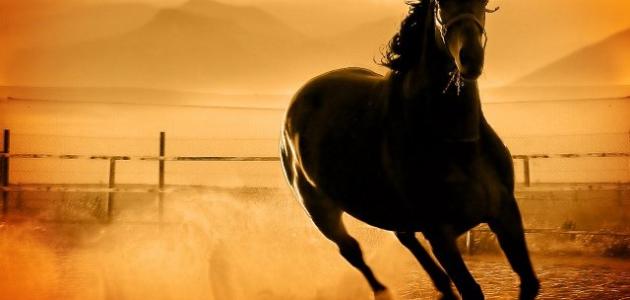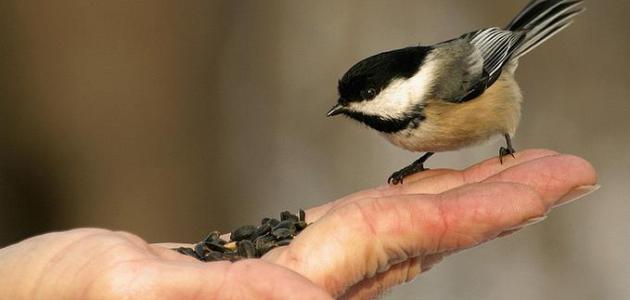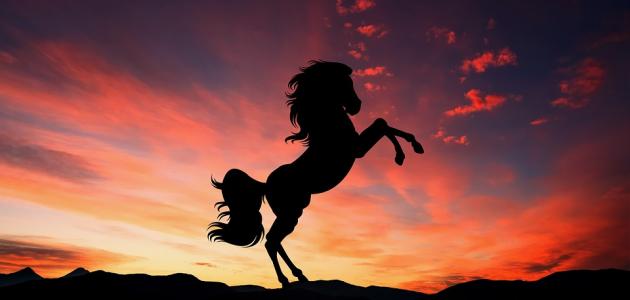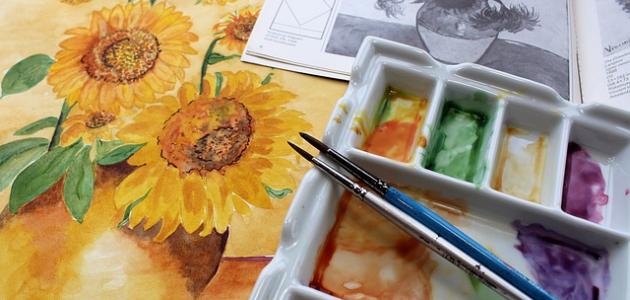Horses are one of the most beautiful animal creatures that God created, and for you here in my article this is the most beautiful thing that was said about horses, I hope you like it.
The most beautiful thing said about horses
Ibn Abbas, may God be pleased with him
If the horse is lost by people
We tied it up, so we shared the kids
We share living every day
And they clothe her with burqas and majesty
Abo Altaieb Almotanabi
I watch the sun as it sets
- And my eyes to my ears, as if they were drowning
From the night, a planet remains between his eyes
- He has a residue on his body in his cuticle
It comes on a generous heart and it goes
- The darkness shrouded him from the bottom of his reins
So he overpowers and relaxes him over and over and plays
- And I will kill any beast I have wrapped around him
And I leave him like him when I ride
- And the horse is only like a few friends
Even if it abounds in the eyes of those who do not experience it
- If he did not see anything but good things
And its members, good is absent from you
the horses and the night and the desert know me
- And the sword, and the spear, and the stationery, and the pen
The dearest place in the world is a swimming saddle
Read also:Quiet and beautiful words- And the best sitter in time is a book
Antar Ibn Shaddad
They call out to Antar and spears as if
- Two wells in the gum of Adham
Antar bin Shaddad
Would you please ask the horse, O daughter of Malik?
- If you are ignorant of what you did not know
As I am still on a wandering swimmer
- Nahd Taawah truffle Mkalmi
Tura narrates to stab and sometimes
- It is intended to harvest the priest Aramram
He tells you who pulled the sign that I am
- I cover the woggy and pardon when the sheep
Antarban Shaddad
I still throw them with a hole in his throat
- And he chewed it until it spilled with blood
So visit the one who signed canna with frankincense
- He complained to me with a lesson and a smile
If only he knew what the interlocutor complained about
- And if he knew speech, he would speak
Imru Al Qais
And the bird has swayed in its corners
- Immediately, the children are bound by a structure
Deception, fleeing, ahead, masterful
- Kjlod rock Hth torrent from above
Kmit goes down forever for the case board
Read also:He who digs a hole for his brother- As Safwa is still in the house
Malik Ibn Al-Rayb
I remembered crying for me, but I did not find
- Except the sword and the spear, crying
And blond knitted dragging his reins
- To the water death did not leave him legs
The poet Shallah bin Hadlan
O my predecessor, the knowledge of the Arabs abounded in you
- Science of kings from the first and then next
I don't want to pledge allegiance and I don't want you to
- I am the one who deserves to calm down
And you are from the forbidden third, and I will not give you
- And you are in it for the world, Sharida Halali
Oh, how sweet the steps of the castle, congratulations
- Rejoice the heart of the loyal friend
Oh, sweet Shamsul from the Bedouins follows you
- In the wilderness of Al-Jazi, Al-Ghazali was brought up
All goodness sprouted in your forelocks
- And guide me to take care of your husband before me
Your right on me is that I am eternal with you
- And on your body, the Khoj, I put my majesty on it
His father, on the cold of Al-Mashati, warms you up
Read also:Sayings about the environment- In the heat, I will place you in the bliss of shadows
I'm running out of your money
- Bring you the punishment of the horse, the wolf of the children
A friendly boy brought you from the palm of your shepherd
- In an hour, men's minds are blown
Oh, my predecessor, we want to banish your walks
- And the distance greeted the honorable men
Yum the south and its monastery, we choose you
- For a quarter of an ounce, deserted and empty
The origin of the Arabian horse
In pre-Islamic legends, it was stated that the horses fled after the collapse of the Marib Dam to the wilderness and became wild. So one day, five Arabs, they are: Jadran, a little, a swimmer, the old man and a trap, went out to the country of Najd, and they saw five horses and their nobles, so they deceived them to catch them and ambushed them near the water resource, where they set up wooden traps. When she fell into an ambush, they left her until hunger and thirst took hold of her, and in the meantime they frequented her and approached her until she became familiar with them and got used to them, until they became domesticated and rode her, aiming for their clubs. During their return, they ran out of provisions, and hunger reached an extreme extent, so they agreed to race towards their tents and slaughter the mare that was late. But after the race, the rider of the last horse refused to slaughter his horse, and he refused except for the race to be repeated. Then another one other than the first mare was delayed, and its knight refused to slaughter it, and so on until they all refused to slaughter their horses. On the fifth day, a herd of antelopes appeared, so they sufficed them from slaughtering, and thus the five mares were delivered. The mare that was ridden by the walls of Saqlawiyah was called because of the smoothness of her hair, and the one he was riding was called Umm Arqoub because of her shank twisting. As for the fifth, which was ridden by Shirak, it was called Obayh because Shirak's cloak fell on her tail, and she kept lifting it with her tail and returning it throughout the race.
The book of horse pedigrees by Ibn al-Kalbi was not devoid of some myths about the origin of the Arabian horses, as he mentioned that all Arabian horses trace their origin back to the saddlebags. Peace be upon him, he inherited a number of horses from his father.
Al-Kalbi narrated on the authority of Ibn Abbas, may God be pleased with them both, that he said: “The first thing that spread among the Arabs from these horses was that a people from Al-Azd from the people of Amman came to Suleiman bin Dawood, peace be upon them both, after he married Balqis, the Queen of Sheba, and asked him what they needed. Whoever commanded their religion and their world, until they had fulfilled what they wanted from that, and they were about to leave; They said, O Prophet of God: Our country is vast, and we have run out of provisions, so he passed us provisions to take us to our country, so Suleiman gave them a mare from the horses of David, and said: This is your provision! When you descend, mount a man on him and give him a spear, gather firewood, and light your fire until he brings you the catch. They will not wait except for a little while until their owner brings them hunting of antelopes, donkeys and cows, and he brings them what suffices them. This was the first horse that spread among the Arabs from those horses.
Ibn al-Kalbi adds that the first mare that spread among the Arabs was “zaad al-knab.” When the Banu Taghlib heard of it, they came to the Azids, and they knocked them, and the Hajis produced for them, and it was the best of the knapsacks. When I heard about it, Bakr bin Wael, they came to Banu Taghlib and knocked them out, so the Dinari hajis came out, and it was better than the hajis. Among his offspring are crooked, the noble, the crow, and the later and torrent.
Whatever the case, recent studies confirm that the Arabian horse is the offspring of the desert, and its natural product. In the desert, it underwent a strict natural selection process. Only the finest, strongest, and fittest horses could withstand the harshness of nature. Even some horse experts believe that every decent breed of horse does not guarantee itself survival without mixing with the purebred Arabian breed. And in order to recognize the horse as a purebred Arab, it must be a direct descendant of the Arabian desert, where the Arabs are keen on the lineages of horses, so they know every horse and its ancestors. They do not only stand with the fathers, but are keen to preserve the pedigree of the horses from the mothers, because they carry the pure and authentic qualities. Among the interest of the Arabs in horses is that they dedicated some of their books to them. Such as (Horse Lineages) by Ibn Al-Kalbi, (Names of Arab Horses, Their Lineages, and Mentions of Their Knights) by Al-Ghandjani, and (Kitab Al-Khalil) by Al-Asmai, and others.
Many horses were famous for their lineage to the great grandfather, and their lineages remained inherited from the place of their origin in the Arabian Peninsula, over the plateaus of Najd and the Asir region. These areas were, and still are, among the most fertile and most suitable for breeding purebred horses. Archaeological discoveries have confirmed that the Arabian horse is native to the Arabian Peninsula, and it was not imported to it from outside. In the book “Sufficient Sayings and Healing Chapters on Horses” by Al-Ghassani, it was stated that the horse’s Arabness, originality, and antiquity is confirmed by Arab sources and the noble hadiths of the Prophet. And that the horses were named Arabs because they are Arab.









